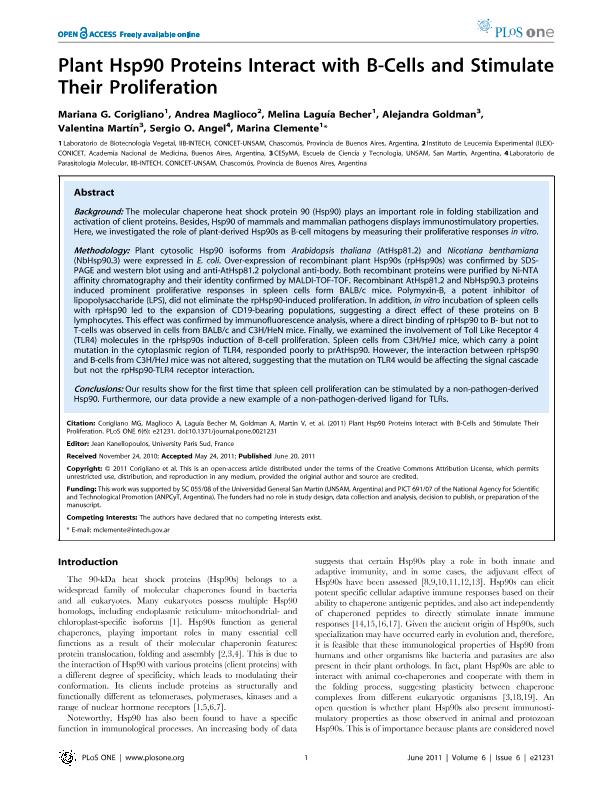Artículo
Plant Hsp90 Proteins Interact with B-Cells and Stimulate Their Proliferation
Corigliano, Mariana Georgina ; Maglioco, Andrea Florencia
; Maglioco, Andrea Florencia ; Laguía Becher, Melina
; Laguía Becher, Melina ; Goldman, Alejandra
; Goldman, Alejandra ; Martín, Valentina
; Martín, Valentina ; Angel, Sergio Oscar
; Angel, Sergio Oscar ; Clemente, Marina
; Clemente, Marina
 ; Maglioco, Andrea Florencia
; Maglioco, Andrea Florencia ; Laguía Becher, Melina
; Laguía Becher, Melina ; Goldman, Alejandra
; Goldman, Alejandra ; Martín, Valentina
; Martín, Valentina ; Angel, Sergio Oscar
; Angel, Sergio Oscar ; Clemente, Marina
; Clemente, Marina
Fecha de publicación:
06/2011
Editorial:
Public Library of Science
Revista:
Plos One
ISSN:
1932-6203
Idioma:
Inglés
Tipo de recurso:
Artículo publicado
Clasificación temática:
Resumen
Background: The molecular chaperone heat shock protein 90 (Hsp90) plays an important role in folding stabilization and activation of client proteins. Besides, Hsp90 of mammals and mammalian pathogens displays immunostimulatory properties. Here, we investigated the role of plant-derived Hsp90s as B-cell mitogens by measuring their proliferative responses in vitro. Methodology: Plant cytosolic Hsp90 isoforms from Arabidopsis thaliana (AtHsp81.2) and Nicotiana benthamiana (NbHsp90.3) were expressed in E. coli. Over-expression of recombinant plant Hsp90s (rpHsp90s) was confirmed by SDS-PAGE and western blot using and anti-AtHsp81.2 polyclonal anti-body. Both recombinant proteins were purified by Ni-NTA affinity chromatography and their identity confirmed by MALDI-TOF-TOF. Recombinant AtHsp81.2 and NbHsp90.3 proteins induced prominent proliferative responses in spleen cells form BALB/c mice. Polymyxin-B, a potent inhibitor of lipopolysaccharide (LPS), did not eliminate the rpHsp90-induced proliferation. In addition, in vitro incubation of spleen cells with rpHsp90 led to the expansion of CD19-bearing populations, suggesting a direct effect of these proteins on B lymphocytes. This effect was confirmed by immunofluorescence analysis, where a direct binding of rpHsp90 to B- but not to T-cells was observed in cells from BALB/c and C3H/HeN mice. Finally, we examined the involvement of Toll Like Receptor 4 (TLR4) molecules in the rpHsp90s induction of B-cell proliferation. Spleen cells from C3H/HeJ mice, which carry a point mutation in the cytoplasmic region of TLR4, responded poorly to prAtHsp90. However, the interaction between rpHsp90 and B-cells from C3H/HeJ mice was not altered, suggesting that the mutation on TLR4 would be affecting the signal cascade but not the rpHsp90-TLR4 receptor interaction. Conclusions: Our results show for the first time that spleen cell proliferation can be stimulated by a non-pathogen-derived Hsp90. Furthermore, our data provide a new example of a non-pathogen-derived ligand for TLRs.
Palabras clave:
PLANT HSP90
,
IMMUNOSTIMULATORY PROPERTIES
Archivos asociados
Licencia
Identificadores
Colecciones
Articulos(ICT - MILSTEIN)
Articulos de INST.DE CS. Y TECNOLOGIA "DR. CESAR MILSTEIN"
Articulos de INST.DE CS. Y TECNOLOGIA "DR. CESAR MILSTEIN"
Articulos(IIB-INTECH)
Articulos de INST.DE INVEST.BIOTECNOLOGICAS - INSTITUTO TECNOLOGICO CHASCOMUS
Articulos de INST.DE INVEST.BIOTECNOLOGICAS - INSTITUTO TECNOLOGICO CHASCOMUS
Articulos(IMEX)
Articulos de INST.DE MEDICINA EXPERIMENTAL
Articulos de INST.DE MEDICINA EXPERIMENTAL
Articulos(SEDE CENTRAL)
Articulos de SEDE CENTRAL
Articulos de SEDE CENTRAL
Citación
Corigliano, Mariana Georgina; Maglioco, Andrea Florencia; Laguía Becher, Melina; Goldman, Alejandra; Martín, Valentina; et al.; Plant Hsp90 Proteins Interact with B-Cells and Stimulate Their Proliferation; Public Library of Science; Plos One; 6; 6; 6-2011; 1-13
Compartir
Altmétricas



